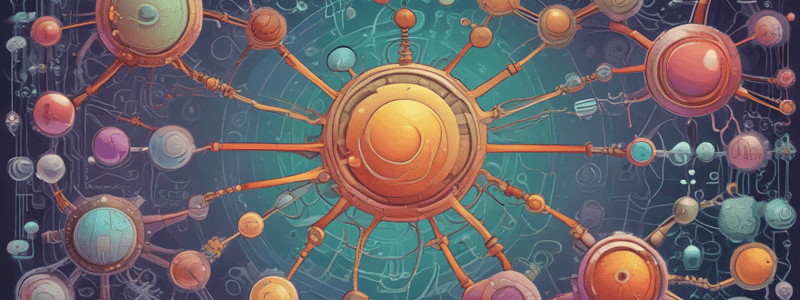Podcast
Questions and Answers
What are the 5 stages of the drug design and development process?
What are the 5 stages of the drug design and development process?
Identification and validation of disease-modifying targets, First studies of initial classes of compounds in animals, More in-depth pharmacology, Large-scale synthesis and formulation studies, Clinical trials
What are the two major strategies for disease-modifying target identification and validation?
What are the two major strategies for disease-modifying target identification and validation?
Molecular approach and Systems approach
What are the three phases of clinical trials?
What are the three phases of clinical trials?
Phase I: safety, dosage, blood studies on healthy individuals; Phase II: efficacy, side effect studies on a limited group of patients; Phase III: efficacy, long-term and rare side effects studied with a large group of patients
When does patent protection usually expire in the drug development process?
When does patent protection usually expire in the drug development process?
Signup and view all the answers
What does ADME stand for in the drug design and development process?
What does ADME stand for in the drug design and development process?
Signup and view all the answers
What are some activities involved in the stage of large-scale synthesis and formulation studies?
What are some activities involved in the stage of large-scale synthesis and formulation studies?
Signup and view all the answers
What are the key aspects tested by a multitude of assays in drug development?
What are the key aspects tested by a multitude of assays in drug development?
Signup and view all the answers
What are some important drug/lead characteristics apart from ADME?
What are some important drug/lead characteristics apart from ADME?
Signup and view all the answers
What is the most common method for optimizing drug leads through molecular modification?
What is the most common method for optimizing drug leads through molecular modification?
Signup and view all the answers
How can bioisosteric replacement affect drug properties?
How can bioisosteric replacement affect drug properties?
Signup and view all the answers
What is the purpose of classical bioisosteres?
What is the purpose of classical bioisosteres?
Signup and view all the answers
Give an example of a nonclassical bioisostere and its advantage.
Give an example of a nonclassical bioisostere and its advantage.
Signup and view all the answers
What are some sources of drug leads mentioned in the text?
What are some sources of drug leads mentioned in the text?
Signup and view all the answers
Why are many natural products highly potent and selective towards drug targets?
Why are many natural products highly potent and selective towards drug targets?
Signup and view all the answers
What are some examples of natural products that have been used to identify and characterize receptors?
What are some examples of natural products that have been used to identify and characterize receptors?
Signup and view all the answers
Why have some biologically active natural products been replaced by other compounds?
Why have some biologically active natural products been replaced by other compounds?
Signup and view all the answers
What is the role of lead development and optimization in drug discovery?
What is the role of lead development and optimization in drug discovery?
Signup and view all the answers
Define pharmacokinetics in the context of drug development.
Define pharmacokinetics in the context of drug development.
Signup and view all the answers
Define pharmacodynamics in the context of drug development.
Define pharmacodynamics in the context of drug development.
Signup and view all the answers
What does ADME stand for in drug development?
What does ADME stand for in drug development?
Signup and view all the answers
Why must a drug be resistant to the action of liver enzymes in the body?
Why must a drug be resistant to the action of liver enzymes in the body?
Signup and view all the answers
How are pharmacokinetics and pharmacodynamics related to a drug's chemical structure?
How are pharmacokinetics and pharmacodynamics related to a drug's chemical structure?
Signup and view all the answers
Study Notes
Drug Design and Development Process
- The drug design and development process involves 5 stages: identification and validation of disease-modifying targets, selection of a promising approach, chemistry, pharmacology, and preclinical studies.
Identification and Validation of Disease-Modifying Targets
- There are two major strategies for identifying disease-modifying targets: molecular approach and systems approach.
- The molecular approach focuses on cells or cell components, using clinical samples and cell models.
- The systems approach studies diseases in whole organisms.
Selection of a Promising Approach
- A multidisciplinary research team is selected to develop a promising approach.
- Budget decisions are made, and chemistry and pharmacology studies are conducted.
Preclinical Studies
- Initial classes of compounds are studied in animals to determine potency, selectivity, and toxicity.
- The most active compounds are synthesized, and their mode of action, efficacy, and toxicity are studied.
- Large-scale synthesis and formulation studies are conducted, and patent protection is applied for.
Clinical Trials
- Clinical trials involve three phases: Phase I (safety and dosage studies on healthy individuals), Phase II (efficacy and side effect studies on a limited group of patients), and Phase III (efficacy, long-term, and rare side effects studied on a large group of patients).
- Regulatory review and marketing follow successful clinical trials.
Important Drug/Lead Characteristics
- In addition to ADME (absorption, distribution, metabolism, excretion), a drug lead should have freedom from mutagenesis and teratogenicity, chemical stability, solubility, and satisfactory taste.
- Medicinal chemists often modify lead compounds to achieve these characteristics.
- Lead optimization involves varying substituents, extending or contracting the structure, ring closures, and simplifying or rigidifying the structure.
Bioisosteres
- Bioisosteres are molecules with modified atoms or functional groups that retain therapeutic potential.
- Bioisosteric replacement can affect molecular properties, such as size, shape, electron distribution, solubility, and reactivity, leading to changes in pharmacokinetic and dynamic properties.
- Examples of classical bioisosteres include H to F, Cl, Br, I, OH, and CH3 replacements.
R&D Expenditures
- Top pharmaceutical companies invest heavily in R&D, with some companies spending over 20% of their total sales on R&D.
- Examples of companies and their R&D expenditures include Regeneron Pharmaceuticals, Vertex Pharmaceuticals, and Boehringer Ingelheim.
Discovery of Drug Candidates
- Traditionally, drug discovery centered on natural products, such as those derived from animal or plant sources.
- More recently, natural products from bacteria and fungi (e.g., penicillin) have been used for drug discovery.
- Endogenous compounds and screening programs are also used to discover drug leads.
Natural Products in Target Identification
- Many natural products are potent and selective towards drug targets due to their toxicity.
- Examples include snake venom, clostridial toxins, and penicillins, which have been used to identify and characterize receptors.
- Morphine, nicotine, and muscarine have been used to identify opioid, nicotinic, and muscarinic acetylcholine receptors.
Lead Development and Optimization
- In addition to pharmacological activity, compounds must fulfill ADME requirements, including absorption, distribution, metabolism, and excretion.
- Issues in lead development and optimization include surviving the harsh stomach environment, digestive enzymes, and liver enzymes.
- Pharmacokinetics and pharmacodynamics are related to a drug's chemical structure and influence the body's response to the drug.
Studying That Suits You
Use AI to generate personalized quizzes and flashcards to suit your learning preferences.
Related Documents
Description
This quiz covers the 5 stages of the drug design and development process, including identification and validation of disease-modifying targets through molecular and systems approaches. It also touches on the selection of research teams, approaches, and budget decisions.




